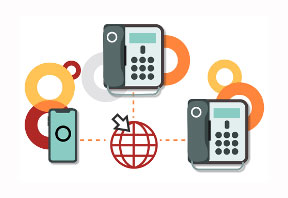Businesses can transform how they communicate with clients by using the latest technology – VoIP is here to help.
By Ken Narita, vice president of business marketing, Ooma
Businesses today face numerous challenges. Missing calls from clients and the public shouldn’t be one of them. Many businesses have switched to VoIP (voice over internet protocol) from traditional landlines in order to lower their monthly phone costs; experience the numerous features and benefits VoIP phone systems offer; and to literally work from anywhere, and still use your office phone number.
To understand VoIP and why it makes sense for you to consider switching to a VoIP phone system, read on. To download the free VoIP Guidebook, please click here for your copy: The Complete Guide to Switching to a VoIP Phone System.

As the name implies, Voice over Internet Protocol phones (VoIP) use the internet to make and receive calls either from analog phones, but mostly through IP (Internet Protocol) phones that easily plug into any Ethernet jack. Once you are connected, you can easily make and receive phone calls.
Technology is truly the most significant difference between VoIP and landline phones. Over the past 100 years, landline phones haven’t changed much as they continue to require infrastructure of wiring and exchange hardware. With the technology that exists today, landlines are limited – basically only allowing you to make and receive voice calls.
VoIP technology is vastly different and has literally changed the ways businesses communicate today, especially through innovation and internet speeds that continue to become faster and faster. While landlines require additional costs for add-on features, VoIP on the other hand offers a myriad of communications features already built-in.
VoIP turns your voice into data transmitted over the internet, just like sending emails. And if you’ve ever used Skype, you’ve already used VoIP.
VoIP calls are made on your phone, connected to the internet with a network cable or adapter, or via a computer’s microphone and speakers using an app. To make calls, VoIP service providers, within a split second, route the voice data between you and the other caller.
As businesses grow, having a phone system that aligns with the publics’ expectations is critical. VoIP systems come with powerful features to help any business make the right impression.

Ken Narita’s marketing career spans two decades of helping businesses large and small grow. Whether advising emerging startups, guiding clients from the agency side or now leading SMB marketing at Ooma, Ken takes an empathetic approach to addressing goals, gaps, and opportunities. At TriNet from 2011 to 2017, he led the revenue marketing team through a period of rapid change where net service revenue grew 15 to 20 percent per year and reached $650 million. Ken has led demand generation, field marketing, customer marketing, and marketing operations teams, integrating campaigns across all functions to drive results. For questions or comments, please email: press@ooma.com.
Scott Ellyson, CEO of East West Manufacturing, brings decades of global manufacturing and supply chain leadership to the conversation. In this episode, he shares practical insights on scaling operations, navigating complexity, and building resilient manufacturing networks in an increasingly connected world.